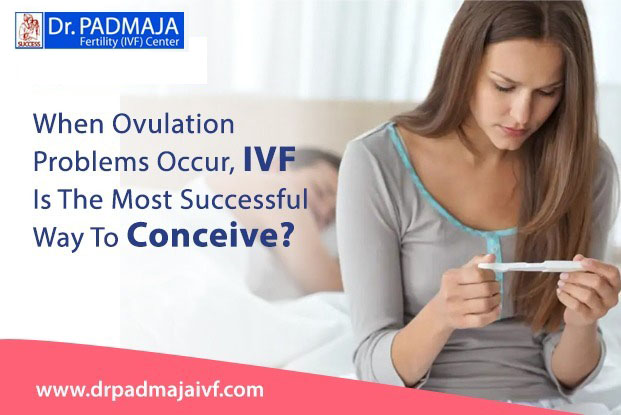Conceiving a child is a beautiful journey, but it is not always a smooth one for everyone. For many couples, fertility challenges, especially those related to ovulation problems, can make this journey more complicated. Ovulation issues, where a woman’s ovaries do not release eggs regularly or properly, are a significant cause of infertility. However, thanks to advancements in fertility treatments, In Vitro Fertilization (IVF) has emerged as one of the most effective ways to help couples conceive, particularly in cases of ovulation problems.
Understanding Ovulation Problems
Ovulation is the process by which an ovary releases an egg, which then travels down the fallopian tube where it may meet sperm for fertilization. If this process is disrupted, it can result in infertility. The most common ovulation disorders include:
Anovulation: When the ovaries do not release an egg at all.
Irregular Ovulation: Ovulation occurs, but not consistently.
Polycystic Ovary Syndrome (PCOS): A hormonal imbalance that can lead to irregular or absent ovulation.
Women who face ovulation problems may experience irregular menstrual cycles, hormonal imbalances, and difficulty getting pregnant. In such cases, traditional methods of conception may not be successful, leaving IVF as the most reliable option.
How IVF Helps with Ovulation Issues
In vitro fertilization (IVF) is a fertility treatment where an egg is fertilized outside the body in a laboratory setting. IVF has become the go-to solution for those facing ovulation problems. Here’s how IVF addresses the challenge of ovulation disorders:
Controlled Ovulation Stimulation: IVF involves ovarian stimulation with medications to encourage the ovaries to produce multiple eggs. For women with ovulation problems, fertility specialists use these medications to regulate the process and enhance the chances of successful egg retrieval.
Egg Retrieval and Fertilization: Once the eggs are mature, they are retrieved from the ovaries and fertilized with sperm in the lab. This bypasses the natural ovulation process entirely, ensuring that viable embryos are created regardless of ovulation issues.
Transfer of Embryos: Following fertilization, the embryos are cultivated for a few days before to being placed into the uterus of the woman. The pregnancy test is done a couple of weeks later to confirm if implantation has occurred.
Why IVF Is the Best Option for Ovulation Problems
For women struggling with ovulation problems, IVF offers several advantages that make it the most successful and reliable treatment:
Higher Success Rates: IVF has been proven to be more effective than other treatments, especially for women who are not ovulating regularly or have conditions like PCOS. The process ensures that eggs are collected and fertilized, increasing the chances of pregnancy.
Precision in Treatment: IVF allows doctors to carefully monitor and control the fertilization process. By using medication to stimulate ovulation, the IVF procedure can overcome ovulation issues and even increase the number of eggs available for fertilization.
Addressing Underlying Causes: IVF can be tailored to address specific fertility issues, such as hormonal imbalances or other reproductive health conditions that contribute to ovulation disorders. For women with PCOS, IVF offers a way to conceive when traditional treatments like ovulation-inducing drugs may not be effective.
Choosing the Right IVF Center
If you’re dealing with ovulation problems, seeking the expertise of the best IVF center is crucial. The best IVF center in Hyderabad is one that offers advanced fertility treatments, experienced doctors, and personalized care. One such trusted place is Dr Padmaja IVF Center, a renowned fertility clinic that specializes in treating ovulation issues and other fertility concerns. With its state-of-the-art facilities, skilled doctors, and high success rates, Dr Padmaja IVF Center has helped countless couples achieve their dream of parenthood.
The Drpadmaja Fertility Center in Hyderabad is another excellent choice for those looking for comprehensive fertility care. Known for its expertise in handling complex fertility issues, including ovulation problems, the clinic provides personalized treatment plans and compassionate care throughout the IVF process.
Conclusion
Ovulation problems can be a frustrating barrier for couples trying to conceive. However, with IVF, the most successful treatment for ovulation-related infertility, many women have found hope. Whether you’re dealing with anovulation, irregular cycles, or conditions like PCOS, IVF offers a scientifically backed solution that bypasses the challenges of natural conception.
Choosing the right fertility center is critical to ensuring the best possible outcome. Dr Padmaja IVF Center and Drpadmaja Fertility Center in Hyderabad are excellent options, providing expert care and cutting-edge fertility treatments to help you overcome ovulation issues and fulfill your dream of having a child. If you are facing ovulation problems, IVF may just be the most successful path toward growing your family.
About The Author :

If Dr. Padmaja Divakar is a public figure or a professional in a specific field, I recommend checking her official website, professional profiles, or reliable online sources for the most up-to-date and accurate information about her background, qualifications, and achievements.
Frequently Asked Questions (faqs)
1.What are ovulation problems, and how do they affect fertility?
Ovulation problems occur when the ovary fails to release eggs regularly or at all. This can result from conditions such as Polycystic Ovary Syndrome (PCOS), hormonal imbalances, or thyroid issues, reducing the chances of natural conception.
2.Why is IVF considered the best option for conceiving with ovulation issues?
IVF bypasses the need for natural ovulation. During the process, eggs are retrieved directly from the ovaries, fertilized in a controlled environment, and then implanted into the uterus, significantly increasing the chances of pregnancy.
3.Is IVF the only option for women with ovulation problems?
Not always. Some cases can be treated with medications like Clomid or Letrozole to stimulate ovulation, or through lifestyle changes. However, IVF is often recommended for severe or persistent ovulation issues.
4.What is the success rate of IVF for ovulation-related infertility?
IVF success rates depend on factors like age, overall health, and the quality of the eggs and sperm. Women under 35 generally have a 50-60% success rate per cycle, while older women may experience lower rates.
5.Are there risks involved in IVF for ovulation issues?
IVF is generally safe, but it can involve risks such as ovarian hyperstimulation syndrome (OHSS), multiple pregnancies, or emotional stress. Consulting a fertility specialist can help manage these risks effectively.
6.How long does IVF take for someone with ovulation problems?
A typical IVF cycle takes about 4-6 weeks from ovarian stimulation to embryo transfer. Additional time may be needed if multiple cycles are required.

